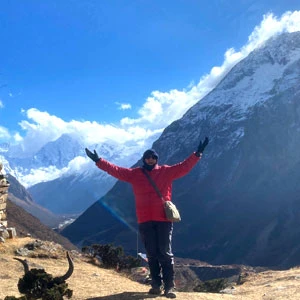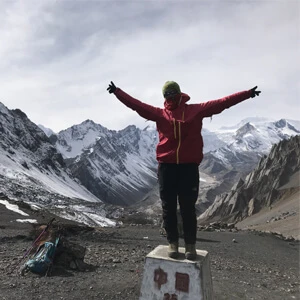What Permits Do I Need to Trek the Annapurna Region in Nepal?
Before you lace up your boots for the Annapurna Base Camp Trek in Nepal, you will need two official permits. Both of these permits are designed to protect the environment and support local communities while ensuring that your journey is officially registered.
The two permits required for the ABC trek in Nepal are:
TIMS Card (Trekkers’ Information Management System): It will cost you around NRs 2,000 (about USD 15). This permit helps authorities track trekkers along the route and enhances safety measures in case of emergencies.
Annapurna Conservation Area Permit (ACAP): It will cost you NRs 3,000 (approximately USD 22). This fee directly contributes to the Annapurna Conservation Area Project, Nepal’s first and largest protected area, funding trail maintenance, waste management, and community development.
You can get both permits at the Nepal Tourism Board (NTB) office in Kathmandu or Pokhara before your trek. But if you are booking with a licensed trekking company like Nepal Trekking Experts (NTE), they will handle everything for you, from filling out forms to obtaining your permits, so you can focus entirely on your adventure.
How Difficult Is the Annapurna Base Camp Trekking Route?
The Annapurna Base Camp Trek is a moderately challenging adventure, making it perfect for anyone with a decent level of fitness and a good dose of determination. Even if you are a beginner, with proper preparation and the right guidance, this Annapurna region trek is absolutely doable.
The trekking route to Annapurna Base Camp (4,130 meters / 13,549 feet) will take you through a beautiful mix of terrain, from lush forests and charming Gurung villages to long stretches of stone steps and steep ascents. Some days, you will walk around 4 to 8 hours, covering anywhere between 6 to 15 kilometers, depending on the trail and your pace.
That said, altitude can be a factor. Once you start gaining height, the thinner air can make breathing harder and cause mild symptoms of altitude sickness if you ascend too quickly. Alongside the altitude, you will also face unpredictable mountain weather. At times, even a sunny morning can turn into a chilly afternoon, which is why staying mentally strong is just as important as physical stamina.
However, with Nepal Trekking Experts (NTE), you will have experienced local guides and porters who know every turn, shortcut, and safe resting point. They will help you maintain the right pace, stay hydrated, and handle logistics so you can focus on the experience.
High Altitude Sickness & Prevention While Hiking to Annapurna Base Camp
One thing to take seriously on the Annapurna Base Camp trek adventure is altitude sickness. It can sneak up on anyone once you cross 2,500 meters, and since the trail gradually climbs to 4,130 meters, it’s something you should be prepared for.
Early signs of Acute Mountain Sickness (AMS) include headache, nausea, dizziness, fatigue, loss of appetite, and sometimes difficulty sleeping. At times, you may even notice slight swelling in your hands or face. These symptoms often appear after the second night at higher altitudes, and they can get worse at night when your body is trying to rest.
Hence, if you feel any altitude symptoms, you must not ignore them. If you start feeling off, stop ascending and give your body time to adjust. Usually, a day of rest, proper hydration, and light meals can help your body acclimatize. But if symptoms worsen, the safest move is to descend 500 to 1,000 meters immediately.
Moving on, trekking with a professional team like Nepal Trekking Experts (NTE) will give you an added layer of safety. Our guides are trained to spot early symptoms and act quickly if needed.
Prevention Tips:
- Avoid rapid elevation gains and adhere to the "climb high, sleep low" principle.
- Drink at least 3 to 5 liters of water daily to prevent dehydration.
- Maintain a balanced diet with complex carbohydrates to sustain energy levels.
- Avoid alcohol and smoking, as these can depress respiration and hinder acclimatization.
- After consulting with your doctor, you can use Acetazolamide (Diamox) to aid acclimatization.
- Incorporate acclimatization days into the itinerary, especially above 3,000 meters.
The Best Time & Month For The Annapurna Sanctuary Trek
If you are planning the Annapurna Sanctuary Trek, the best time is during the Spring and Autumn seasons when the weather is stable, the skies are clear, and the views of the Himalayan peaks are absolutely stunning.
March to May offers blooming rhododendrons, fresh greenery, and pleasant temperatures, while September to November delivers crisp air, minimal rainfall, and panoramic mountain vistas. Lastly, October is the best month for unforgettable scenery and perfect trekking conditions.
Trekking To Annapurna Base Camp In Spring
Trekking to Annapurna Base Camp in Spring (March to May) offers an unforgettable experience. The weather is typically stable, with daytime temperatures ranging from 10°C to 20°C at lower altitudes. As you ascend, you will pass through vibrant rhododendron forests in full bloom. This season also boasts clear skies, providing unobstructed views of the majestic Annapurna and Machapuchhre peaks.
March Highlights
- March marks the beginning of Spring season in the Annapurna region.
- As Winter ends, days grow warmer day by day, making trekking in Nepal more comfortable.
- Even though mornings and nights in early March can still be slightly cold, once the sun rises, the days get warmer.
- Typically, the skies are clear with mild daytime temperatures.
- There is minimal chance of rainfall; hence, the trails are drier and safer.
- You will enjoy eye-catching views of iconic Himalaya peaks: Machhapuchhre (Fishtail), Annapurna I, Gangapurna, Hiunchuli, Dhaulagiri, Lamjung Himal, among others.
- Early in March, the trails tend to be comparatively peaceful, with fewer trekkers.
- Some snow patches may still linger on higher or shaded trail sections, but these gradually melt by the end of the month.
- Rhododendron buds begin to emerge.
- In Kathmandu and Pokhara (pre- or post-trek), you will get to witness vibrant local festivals such as Holi and Ghode Jatra.
- Wildlife activity may increase slightly.
April Highlights
- April offers stable weather in the Annapurna region, combining warmer daytime temperatures with crisp and clear skies, which is ideal for mountain photography.
- In alpine altitudes around ABC, you will also enjoy comfortable temperatures which will help in acclimatization.
- Forests and hillsides burst into full bloom, especially with rhododendron forests and wildflowers like primroses, orchids, magnolias, and golden raspberries.
- You will witness exquisite and uninterrupted views of iconic Himalayan peaks: Annapurna I, Annapurna South, Machapuchhre (Fishtail), Hiunchuli, Nilgiri, Lamjung Himal, Gangapurna, etc.
- Trekking trails are more stable with easier river crossings, stable trail, and melting snow in higher zones.
- April is perfect for capturing striking nature photography as well. You will find vibrant flowers in the foreground, snow-capped peaks in the background, and sunrise/sunset light spectacular against clear Himalayan ridges.
- Wildlife and birdlife are more visible with species such as the Great Barbet (Nyauli), Green-tailed Sunbird, Common Hill Partridge, and forest songbirds.
- You will get to witness celebrations such as Nepali New Year (Navavarsha) around mid-April.
- April is arguably the peak month of Spring, yet it is less crowded than Autumn.
May Highlights
- May marks the transition from Spring into early Summer.
- In May, you will often get perfectly clear weather and blue skies, revealing stunning Himalayan giants like Annapurna I (8,091 meters), Machapuchhre (6,993 meters), Hiunchuli (6,441 meters), and Annapurna South (7,219 meters).
- The days are generally warm, though toward mid to late May, the possibility of light rain showers emerges.
- Mornings in May are often crisp and clear, with spectacular sunrise vistas. However, in the afternoon you might see patches of clouds, but visibility usually remains excellent, especially for sunrise and sunset.
- The trekking trail is painted in vivid red, pink, and white rhododendron hues.
- You may also spot langur monkeys, Himalayan monals, and various forest birds along the trail.
- You will also experience longer daylight hours.
- May features festivals such as Buddha Jayanti, Bisākh Jātrā (Bisket Jatra), and Red Machhendra Jatra.
Trekking To Annapurna Base Camp In Autumn
Autumn (September to November) is widely considered the best time to trek to Annapurna Base Camp. After the monsoon rains, the skies clear up, offering crisp mountain air and panoramic views of the Annapurna and Machapuchhre peaks. The trails are dry and well-maintained, with moderate temperatures.
September Highlights
- As Monsoon gradually ends by late August, early September may still see light showers, but the heavy rains recede and trails begin to dry.
- Daytime and nighttime temperatures are mild.
- September has minimal rainfall with fresh mountain air.
- The landscape remains lush and vibrant, freshly washed by the monsoon.
- Hills and valleys are filled with blooming wildflowers.
- Waterfalls and rivers along the mountain trails appear more powerful and spectacular due to recent monsoon rains.
- In comparison to October and November, September is less crowded.
- Good visibility of Himalayan peaks like Annapurna I, Machapuchhre (Fishtail), Hiunchuli, Annapurna South, etc.
October Highlights
- October is widely regarded as the best time for Annapurna Base Camp trekking in Nepal.
- Trekking routes begin to fill up quickly with people from all over the world in October.
- October provides excellent weather and magnificent views with clear skies, crisp air, stable daytime temperatures, and visibility almost every day of the trek.
- Two of Nepal’s biggest festivals, Dashain and Tihar, occur in October, and trekking during this time lets you witness vibrant cultural celebrations in the villages along the ABC trail.
- Witness the charm of peaks like Annapurna I, Annapurna South, Machapuchhre (Fishtail), Hiunchuli, Dhaulagiri, and many others.
- Low precipitation levels make October one of the driest months on the trail.
- You will get to enjoy crisp morning light on ridges and valleys for excellent sunrise and sunset moments.
November Highlights
Annapurna Base Camp trek in November offers incredible views of the Himalayas with crystal-clear skies, stable post-monsoon weather, and exceptional visibility of peaks like Annapurna I, Machapuchhre (Fishtail), Hiunchuli, Annapurna South, and others.
- November is known for moderate daytime temperatures and crisp, cool mornings and nights, especially above 3,000 meters.
- You will face occasional high-altitude cold breezes and winds during early mornings or dusk, particularly towards the end of the month.
- By late November, temperature especially at Base Camp and higher altitudes begins to drop significantly, and you may start to witness light snowfall or frost in shaded or higher elevation sections.
- November trails are less crowded than October.
- The landscape remains lush from post-monsoon greenery.
Is It Possible For ABC Trek In Winter?
Yes, trekking to Annapurna Base Camp in Winter (December to February) is possible, but it’s definitely a season for the well-prepared and adventurous. Early winter in December can still be manageable, with light snow above 3,000 meters, crisp clear skies, and jaw-dropping views of Annapurna I, Machapuchhre (Fishtail), Hiunchuli, and Dhaulagiri.
By January, however, higher trails can be snow-covered, icy, and more challenging, with shorter days and sub-zero nights at ABC itself. Similarly, tea houses may be limited, and avalanche risks increase on certain slopes. Despite these challenges, Winter offers solitude on the trail, pristine snowy landscapes, and incredible photographic opportunities.
All in all, Winter ABC trekking is recommended for fit trekkers with winter experience, or those willing to train with the right guidance. Moving on, for winter adventure, you must partner with a reputable agency like NTE, so that we can assist you with proper gear, training tips, flexible itineraries, and experienced guides and porters.
How To Prepare For Winter ABC Trek:
- Gear & Clothing: heavy winter-rated sleeping bags, insulated down jackets, thermal layers, waterproof/windproof outerwear, insulated boots, crampons or microspikes, gaiters, warm gloves, hats.
- Route Buffer days: build in extra days in the itinerary for delays due to snow, weather, or slower pace.
- Acclimatization: ensure gradual climb, rest days or partial rest days, hydration, and avoid going too fast.
- Skills & Fitness: prior cold exposure training, physical endurance (walking many hours with a load), and possibly experience walking on snow or icy terrain.
- Local support: NTE provides experienced guides and porters who are used to Winter ABC. The support team has knowledge of winter trail conditions, the ability to read avalanche risk, ability to ensure safe lodging, heating, and pre-booked accommodations where available.
- Emergency preparedness: good travel insurance covering high-altitude and winter conditions, knowledge of backup plans, carrying communication tools, and any emergency gear.
Is Annapurna Trek Recommended In The Monsoon Season?
Trekking to Annapurna Base Camp during the Monsoon season (June to August) is generally not recommended for trekkers due to heavy rainfall, slippery trails, low visibility, and a higher risk of landslides. Nepal receives about 80% of its annual rainfall during these months; hence, the paths are muddy, rivers are swollen, and some tea houses or lodges are less accessible.
Likewise, cloud cover often hides the majestic Annapurna and Machapuchhre peaks, though early mornings sometimes offer fleeting glimpses of these stunning views. You will also find leeches in forested lower regions, unpredictable storms, and blocked trails during this journey. That said, if you are an experienced trekker prepared with strong gear, a flexible itinerary, and expert guidance from agencies like Nepal Trekking Experts, Monsoon trekking can offer a quieter trail, dramatic post-rain landscapes, and a unique “off-season” Annapurna experience.
NTE's Support For Monsoon Trekking:
- Experienced guides & porters: Trained for monsoon conditions, local knowledge of safer alternative paths, monitoring trail hazards, and able to respond to changing conditions.
- Flexible itineraries & buffer days: Built-in extra days to deal with delays, rest, weather changes, and alternative routing if needed.
- Gear & logistics support: Advice on waterproof gear, leech protection, route planning, and emergency contingency.
- Real-time communication & weather updates: Monitoring forecasts, adjusting daily plans, and ensuring safety.
- Local network & lodge coordination: Prearranged accommodation, knowledge of which tea houses operate in the monsoon, and support in case some stops are closed.
- Emergency & evacuation readiness: Insurance support, contingency plans, and ability to descend earlier if conditions worsen.
Tips For ABC Trekking In Monsoon Season:
- Start early (6 am or 7 am) to take advantage of clearer morning skies before afternoon rain.
- Monitor daily weather forecasts and cloud trends along the Annapurna Base Camp trekking route.
- Avoid known landslide and flash-flood zones by consulting local guides and agency updates.
- Wear waterproof and quick-dry clothing, use rain covers and dry bags for gear protection.
- Use leech-proof socks or gaiters and carry insect repellent for rainy forested segments.
- Adjust schedule dynamically: shorten or postpone treks when conditions worsen.
- Ensure you stay well hydrated despite humidity and rain conditions.
- Hire a reputable guide and porter team (such as through Nepal Trekking Experts) to navigate tricky sections.
- Carry a solid travel insurance policy that covers trekking in wet, high-altitude terrain in Nepal.
- Pack essential safety gear (trekking poles, good boots, crampons if needed) for muddy/slippery trails.
Do I Need A Guide And Porter For The Annapurna Base Camp Trek?
If you are planning the Annapurna Base Camp trek, hiring a guide and porter can dramatically improve your safety, comfort, and overall experience. The route features steep ascents and descents, narrow trails, river crossings, high-altitude terrain, and sometimes snow or ice depending on the season. Carrying a heavy backpack day after day on challenging terrain can quickly lead to fatigue, making a porter a real lifesaver.
Since April 2023, the Nepal government requires a registered guide for certain trekking regions, including Annapurna. Hiring a licensed local guide brings deep knowledge of the trails, avalanche and weather risks, first aid, emergency rescue, and alternate routes if paths are blocked. Beyond safety, they also offer rich insight into local Gurung and Magar culture, traditions, and mountain life.
Moving on, a trained porter carries up to 20 kg of your gear, including sleeping bags, extra clothes, and trekking equipment, so you can enjoy the journey with a lighter daypack. This not only eases the strain on your knees and back but also allows you to maintain a better pace and fully appreciate the spectacular scenery along the Annapurna trail.
Through reputable agencies like Nepal Trekking Experts (NTE), hiring a guide typically costs around USD 35/day, while a porter costs about USD 25/day. These rates usually include salary, accommodation, meals, and insurance. Tips are customary at the end of the trek, typically around 10 to 15% of their total wages, and more if you are completely satisfied with their service.
Altogether, hiring a guide and porter is highly recommended for first-time trekkers, solo travelers, anyone not accustomed to high-altitude trekking, or those trekking during off-seasons.
Tips For A Successful ABC Trekking
- Begin physical preparation months in advance by building cardio, leg strength, stamina (walking, stair climbing, weighted backpack training) to handle long trekking days.
- Use a flexible itinerary with buffer days built in, so you can adjust for bad weather, slow days, or rest as needed.
- Follow the principle of gradual acclimatization (“climb high, sleep low”) and avoid big altitude jumps per day, rest when needed to reduce risk of altitude sickness.
- Stay well hydrated. Drink around 3 to 4 liters of water per day.
- Prioritize carbohydrates and energy-rich meals.
- Carry safe water purification methods such as purification tablets, filters or UV treatment, so you can drink from streams or local sources safely.
- Bring and manage essential gear properly such as trekking poles, layered clothing, waterproof jacket, good boots, headlamp, spare batteries, first-aid kit, etc.
- Book accommodations, permits & transport in advance, especially during peak seasons, to avoid last-minute issues.
- Trek in ideal seasons (Spring or Autumn) when weather is stable, trails are clearer, and views are at their best.
- Budget for extra costs and emergencies.
- Ensure you have travel insurance covering high-altitude trekking, medical emergencies, and rescue/evacuation, if needed.
- Carry snacks & energy bars to maintain energy and blood sugar.
- Monitor your body and altitude symptoms daily.
Transportation Availability And Cost For The Annapurna Trek
Getting to and from the trekking trail is simple and stress-free when you book your Annapurna Base Camp adventure with Nepal Trekking Experts (NTE). The journey kicks off with a scenic drive from Kathmandu to Pokhara, covering about 205 km of diverse landscapes. Depending on your budget and comfort preference, you can choose a local tourist bus for an authentic experience, a private jeep for more flexibility and speed, or even skip the road entirely with a short flight from Kathmandu to Pokhara.
Flights between Kathmandu and Pokhara typically cost around USD 105 per person one-way, saving you several hours on the road while offering stunning aerial views of the Himalayas. However, local buses are the most economical option, while a private jeep adds convenience if you want a more personalized and comfortable journey.
Local Bus or Microvan
If you are looking for the most budget-friendly and authentic way to start your Annapurna Base Camp trek, a local bus or microvan is your go-to choice. The journey begins early, around 6 AM, from Gongabu Bus Park in Kathmandu, so you must be ready for an energetic start to your adventure. Local buses are lively and chaotic, packed with both travelers and locals, offering a real slice of Nepali daily life.
The ride from Kathmandu to Pokhara takes about 6 to 7 hours and costs roughly USD 20 per person. Once in Pokhara, the onward journey to Nayapul, the official trekking gateway, costs around USD 5, giving you a chance to enjoy more scenic hills and river valleys.
Private or Shared Jeep
If comfort, flexibility, and style matter to you, a private or shared jeep is the way to go. Unlike the local bus, a jeep picks you up right from your hotel and lets you travel at your own pace. You can enjoy air conditioning, wide seats, extra legroom, and the freedom to stop whenever a scenic view catches your eye.
The Kathmandu to Pokhara ride in a private jeep costs around USD 240 per person, while Pokhara to Nayapul is approximately USD 60 per person. Indeed, private jeeps are pricier than local buses, but the convenience and comfort often make the splurge worth it. Later, on the return journey from Jhinu Danda to Pokhara, only shared jeeps operate, costing about USD 80 per person.
Accommodation, Hot Showers, Meals, and Drinking Water On The ABC Trek
Tea House Accommodation During The Annapurna Route
One of the highlights of trekking the Annapurna Base Camp route is the chance to stay in traditional tea houses along the trail. In the lower villages, you will find well-furnished rooms, attached bathrooms, hot showers, Wi-Fi, and even charging ports. As you ascend above 3,000 meters, the tea houses become more basic but cozy, offering simple rooms with a bed and blanket, shared squat toilets, and bucket showers.
While there’s usually a wood stove in the communal dining hall, room heaters aren’t provided, so you must pack a warm sleeping bag. If you do not have one, Nepal Trekking Experts can provide for you. These tea houses not only offer rest but also a chance to experience local hospitality and mingle with fellow trekkers.
Hot Shower Availability On The Annapurna Base Camp Trek
Yes, you can enjoy a hot shower along the Annapurna Base Camp trek, though what you get depends on your altitude. In the lower villages, proper shower stalls with hot running water are available. As you climb higher, above 3,000 meters, you should expect warm bucket showers. They are basic but soothing after hours on the trail. A hot shower usually costs just a couple hundred Nepali rupees (around USD 2 to 3).
Pro tip: pack wet wipes, hand sanitizer, a bar of soap, and dry shampoo to keep clean between stops, especially at higher tea houses where facilities are more rustic.
Meals And Food Options In The Annapurna Region
One of the joys of trekking in the Annapurna region is the surprisingly diverse and satisfying food along the way. With Nepal Trekking Experts’ package, you get three hearty meals a day: breakfast, lunch, and dinner, plus tea or coffee.
Breakfasts consist of various items such as pancakes, Tibetan bread, omelets, porridge, boiled eggs, chapati with jam, and the traditional Tsampa porridge. Lunch and dinner highlight local favorites like dal bhat, fried noodles, chowmein, pasta, momo, macaroni, and even Sherpa stew or thukpa. Here, Dal bhat is the staple and will power you through long trekking days.
Moving on, dietary needs are not a problem, whether it be vegan, vegetarian, gluten-free, and dairy-free options, as all of them can be accommodated. However, you will need to inform your Nepal Trekking Experts guide in advance, and they will coordinate with the tea house kitchens to make sure your meals are just right.
Similarly, drinks are equally varied with hot lemon, black tea, masala or ginger tea, instant coffee, soft drinks like Coke or Fanta, and bottled juices. Now, if you want a taste of local tradition, you can try Chyang (millet beer) or Raksi (local moonshine), which are both iconic to the Annapurna region.
Safe Drinking Water On The Route
Staying hydrated on the Annapurna Base Camp trek is crucial, but safe drinking water can be tricky along the trail. Bottled water is available in most tea houses, but it can be expensive and generates a lot of plastic waste. Boiled water is a safer option, usually offered for a small fee, but costs can quickly add up over 10 to 14 days.
The most cost-effective and eco-friendly solution is to use water from natural sources like streams, taps, and springs, but only after proper purification. Nepal Trekking Experts recommend carrying two reusable water bottles and a reliable water purification method, such as tablets or a portable filter. This keeps you hydrated, saves money, and helps reduce your environmental footprint while trekking through the Annapurna region.
Mobile Connectivity, Wi-Fi, & Electricity During Annapurna Base Camp Trekking Adventure
Mobile Connection
Staying connected while trekking the Annapurna Base Camp route is possible, but you should not expect full coverage everywhere. As you climb higher into the mountains, mobile networks get weaker, and connections can become patchy or unreliable, especially near Annapurna Base Camp itself.
The two main SIM options in Nepal are Ncell and NTC (Nepal Telecom), with NTC generally offering better coverage across the Annapurna region. You can easily buy a SIM in Kathmandu or Pokhara, but make sure to carry a passport copy and a valid visa, as it’s required for registration.
Wi-Fi Availability
In the lower villages, you can usually find a reasonably stable connection, though it comes for a small fee, which is typically a couple of hundred Nepali rupees per night. As you climb higher, especially above 3,000 meters, the Wi-Fi gets sketchier and may drop out entirely depending on altitude, weather, and the number of users. For the most reliable access, you can pick up a Nepal Telecom (NTC) SIM card, top it up with a data package, and activate roaming before you hit the trail.
Electricity Availability
Electricity along the Annapurna Base Camp trek is generally available, but access varies with elevation. In the lower villages, many tea houses offer charging ports right in your room. As you climb higher, lodges mostly rely on solar power, so electricity can be limited, especially on cloudy or overcast days. Most lodges provide charging in the communal dining hall for a small fee, which works well if you plan ahead. Here, it is also wise to bring a power bank or two and even a portable solar charger.
Recommended Trekking Gear & Equipment For The Annapurna Base Camp Hiking Tour
Clothing:
- Moisture-wicking thermal shirts and leggings
- Fleece jacket or down vest
- Waterproof and windproof jacket and pants
- A down jacket or puffer
- Quick-dry, lightweight, and comfortable trekking pants
- Moisture-wicking and breathable t-shirts
- Warm insulated gloves
- Sun hat or cap
- Comfortable, moisture-wicking, and quick-dry underwear
Footwear:
- Thermal socks
- Sturdy, waterproof, well-broken-in trekking boots with ankle support
- Lightweight sandals or sneakers
Trekking Gear & Equipment:
- 40 to 50L daypack for essentials
- Sleeping bag: Rated to at least -10°C / 14°F
- Adjustable trekking poles
- Headlamp or flashlight with extra batteries
- Water bottles with water purification tablets or a filter
- UV protection sunglasses
- Rain cover for backpack
Personal Items:
- Camera or smartphone
- Power bank and or solar charger
- First aid kit with bandages, antiseptic, painkillers, blister treatment.
- Personal hygiene: Biodegradable soap, toothbrush, toothpaste, hand sanitizer, tissues, and toilet paper.
- Sunscreen SPF 40+, lip balm with SPF, moisturizer.
- Snacks or energy bars
- Any personal prescriptions, pain relief, and altitude sickness medication. (with doctor's consultation)
Do I Need Travel Insurance To Trek The Annapurna Base Camp?
Absolutely, travel insurance is a must for the Annapurna Base Camp trek. With elevations soaring over 4,000 meters and two weeks of continuous trekking, you may face potential challenges like altitude sickness, unpredictable weather, and tricky terrain. Here, the right insurance acts as your safety net when things don’t go as planned.
However, you must make sure your policy covers trekking above 5,000 meters, altitude-related illnesses, medical treatment, emergency evacuation, trip cancellation, and baggage loss. Also, before buying, you must read the fine print carefully and check whether it offers direct coverage or upfront reimbursement.
Nepal Entry Visa For The ABC Trek
Getting your Nepal entry visa for the Annapurna Base Camp trek is straightforward. When you land at Tribhuvan International Airport in Kathmandu, you should head to the visa-on-arrival kiosk, fill out the electronic form, and pay the fee. Here, cash is usually easier than a card.
Now, you can also apply for the Nepal visa in advance at a Nepalese embassy or consulate in your home country if you prefer. For it, you must make sure your passport is valid for at least six months from your arrival date. Nepal offers 15-day, 30-day, and 90-day tourist visas, giving you flexibility depending on your trekking itinerary.
Nepal Currency & Payment Mode
When trekking to Annapurna Base Camp, knowing your Nepal currency and payment options is important. The Nepali Rupee (NPR or NRs) is the national currency, and currently, 1 USD equals around 132 to 135 NRs. You can exchange major foreign currencies at banks or licensed money exchange centers in Kathmandu or Pokhara, but keep in mind that on the trekking trail, it’s a cash-only zone. In cities, both cash and cards work, though card payments carry a 3 to 4% surcharge.
ATM Availability In Nepal
Major cities like Kathmandu and Pokhara have plenty of ATMs that work with international cards, making it easy to grab cash before your adventure. However, you must be aware of a transaction fee (around USD 5 per withdrawal) and daily withdrawal limits, usually NRs 25,000, depending on your bank. Since ATMs are non-existent on the trekking trail, it’s smart to withdraw all the cash you will need before leaving the city.
Why Should You Book The Annapurna Base Camp Trek With Nepal Trekking Experts?
Trekking with Nepal Trekking Experts (NTE) means you get local expertise, safety, comfort, and unforgettable experiences. Here’s why:
- Local guides and porters born and raised in the Annapurna region, with deep knowledge of trails and culture.
- We have over a decade of hands-on experience trekking across Nepal.
- NTE is government-certified by TAAN, Nepal Tourism Board, and NMA.
- Our staff are professionally trained in high-altitude safety, first aid, and emergency response.
- We offer custom itineraries with ideal pacing, acclimatization, and flexible options for group or private treks.
- We maintain strong relationships with local tea houses to secure the best accommodations even in remote areas.
- If needed, we will provide free rentals of essential trekking gear like sleeping bags, poles, down jackets, and crampons.
- NTE is 5-star rated on TripAdvisor by real trekkers for quality, safety, and guidance.
- Health, security, and well-being are top priorities throughout your trek.
- We offer fast and reliable responses to all queries before and during your journey.
- We ensure transparent and fair pricing with no hidden costs.
With Nepal Trekking Experts, you will be able to experience the Annapurna Base Camp trail with confidence, comfort, and authentic Himalayan guidance.



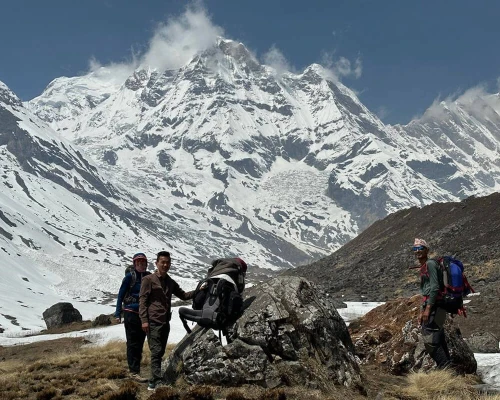
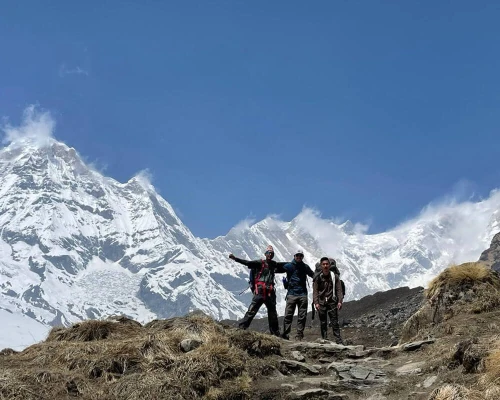
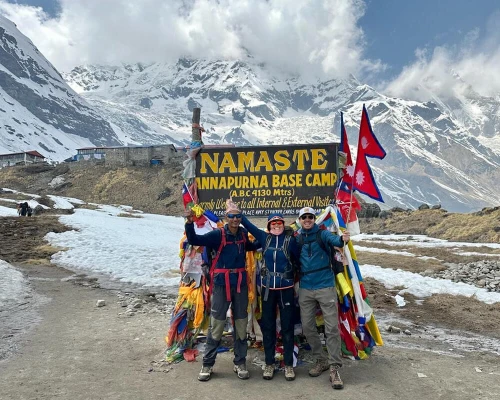
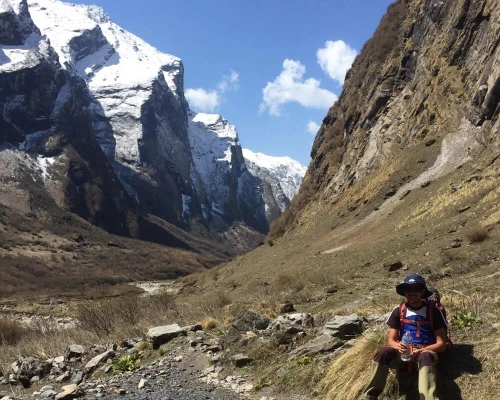
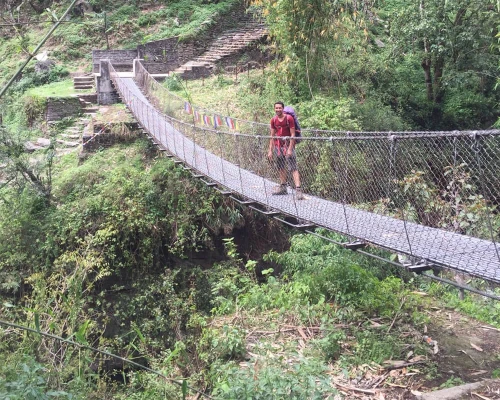
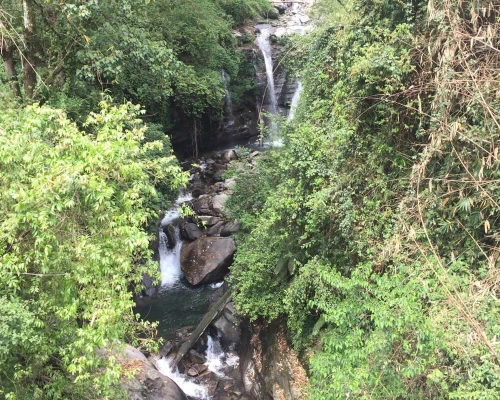
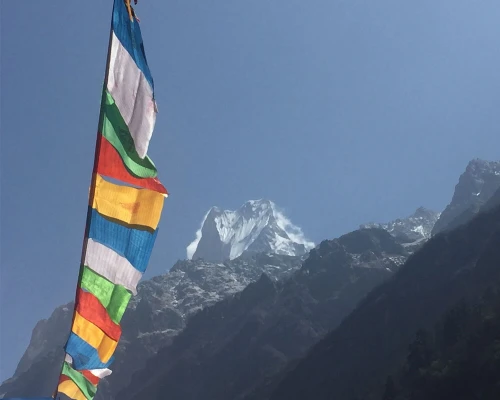
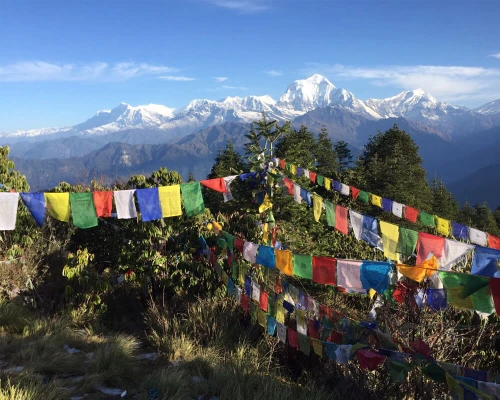

 based on 12 reviews
based on 12 reviews




